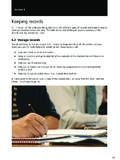Transcription of How to Avoid Choking under Pressure
1 How to Avoid Choking under Pressure Afraid of crumbling when it counts? Try not to think so hard. By Elizabeth Svoboda We choke under Pressure because such conditions thwart the normal brain processing of tasks that are so well learned they have become "automatic." CORBIS Key Concepts We choke under Pressure because such conditions thwart the normal brain processing of tasks that are so well learned they have become automatic. Trying to concentrate on monitoring the quality of your performance is counterproductive because the cerebellum, which controls complex motor tasks, is not consciously accessible. Ratcheting up the Pressure at your practice sessions is the best way to Avoid failing when it counts.
2 You ve practiced your big presentation a thousand times. Your last rehearsal was perfect, and you re ready to go. You tell yourself that for the real thing, you will focus on keeping your voice up, smiling, and enunciating clearly and slowly. Suddenly, at the podium, you freeze all your preparation is for naught as you stand there like a deer in headlights. What happened? and we all have had the experience. But why do we sometimes, without warning, inexplicably screw up just when it matters most? The answer lies in the way our brains are structured. When we have practiced something so well that we no longer need to think about it, subconscious processing systems are at work.
3 When we then slow down to focus on these automated actions, we can thwart those processes, tripping ourselves up. And a raft of recent research is revealing who drops the ball and when, yielding surprising insights that could help frequent flubbers leave their self-sabotaging tendencies behind. Don t Concentrate Since the early 1980s researchers have been studying in earnest the question of why we choke. In 1984 Florida State University psychologist Roy Baumeister officially defined Choking as performance decrements under Pressure circumstances. Ongoing research in the past 25 years has established that factors such as audience Pressure and high performance expectations make us especially vulnerable to Choking just as perennial chokers might surmise.
4 But in recent years, scientists have started arriving at more counterintuitive insights about the circumstances that court Choking . Well-meaning experts often advise performers to take their time slowing down delivery, the thinking goes, helps to quell nervousness but it is actually better just to get on with things if you are well rehearsed, says psychologist Sian L. Beilock of the University of Chicago. In a 2008 study she divided novice and skilled golfers into two groups and instructed them to perform a series of golf putts. The researchers encouraged members of the first group to take their time, whereas they exhorted members of the second group to swing as quickly as they could.
5 Novice golfers performed less accurately when speed was emphasized, but skilled golfers showed exactly the opposite pattern: they performed best when told to execute quickly and faltered when advised to take their time. (This result adds weight to the long-held notion, confirmed by previous studies, that some experienced golfers develop the yips muscle tremors or freezing up when they assume a position for a prolonged period before putting.) Beilock speculates that this pattern occurs because taking extra time to perform when you have already practiced ad infinitum can encourage too much conscious thought. These golfers were really hurt when we asked them to pay too much attention, she says.
6 What happens under stress is that they do start worrying, and in response to that they start monitoring their performance. The idea that too much self-monitoring hinders performance aligns with the well-established theory of how the brain learns to perform complex motor skills anything from speaking to typing to cradling a lacrosse ball. The part of our brain that is most involved in learning a new task is the cerebral cortex, which controls higher-order, conscious thought and is adaptable to novel situations. But as we play a piece of music or practice a speech over and over again, we gradually transfer the control of that activity from the cerebral cortex to another area of the brain, the cerebellum, which orchestrates the lightning-fast motor activation needed to perform complex actions.
7 The cerebral cortex is very good at general-purpose stuff but not at intricately timed things, says Boston University neurologist Frank Guenther. You want to get the better-equipped part of the brain doing the job for these tasks. Thus, when people are learning something new they show high levels of activity in the cerebral cortex, whereas when they perform a task they already know well they show more activity in the cerebellum. The wrinkle in this system is that the cerebellum, unlike the cerebral cortex, is not consciously accessible. As a result, Guenther says, it is when chokers try to check their progress as they are performing that they run into trouble. Let s say you re trying to play the piano.
8 If you were relying on your motor memory just letting it fly your motor command would automatically read out the next note in about 50 milliseconds. But consciously monitoring your performance brings this superfast sequence of motor commands to a screeching halt, resulting in a Choking incident of epic proportions. The feedback from the first note takes 100 milliseconds just to move from your cochlea up to your brain. So if you re saying to yourself, Okay, I just finished the C, now I have to go on to the D, you re going to have problems. But how much monitoring is too much? Obsessing over every little detail can be perilous, but daydreaming might leave you without sufficient focus to complete a task at all.
9 To find the happy monitoring medium, psychologists Daniel Gucciardi and James Dimmock of the University of Western Australia recruited 20 expert golfers and instructed them to perform putts in three circumstances. Players in the first group focused on three words that stood for aspects of their physical technique (such as head, weight and arms ); the second group focused on three words that had nothing to do with the putt (for example, red, blue and green ); and the third group focused on a single word that encapsulated the putting motion (such as smooth ). Initially, the golfers putted in a low- Pressure situation, and most of them did well. During a second trial, however, Gucciardi and Dimmock ratcheted up the tension by offering the top performers cash prizes.
10 The players sailed through the second trial with flying colors except the ones who focused on multiple aspects of their putt, according to the results published in the January 2008 Psychology of Sport and Exercise. When they were focusing on the three representative mechanical processes, that was when their performance dropped, Gucciardi noted. Similarly, in 1999 psychologist Lew Hardy of the University of Wales found that performers who think about a concrete, detailed set of rules during their moment in the spotlight ( keep skis high in the air and keep body streamlined for a ski jumper, for instance) are more likely to succumb to Pressure than are those who do not have such a specific set of rules in mind.







